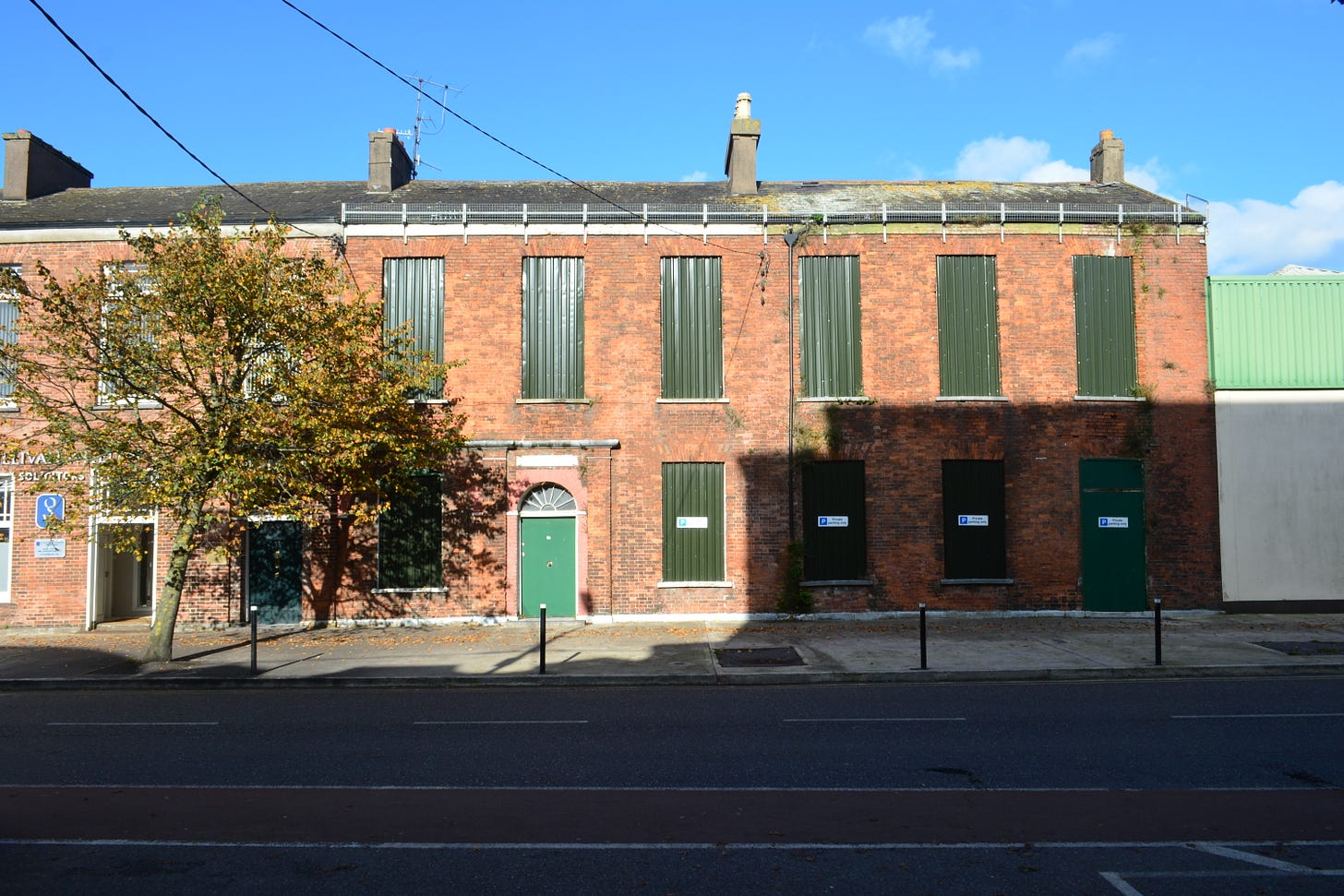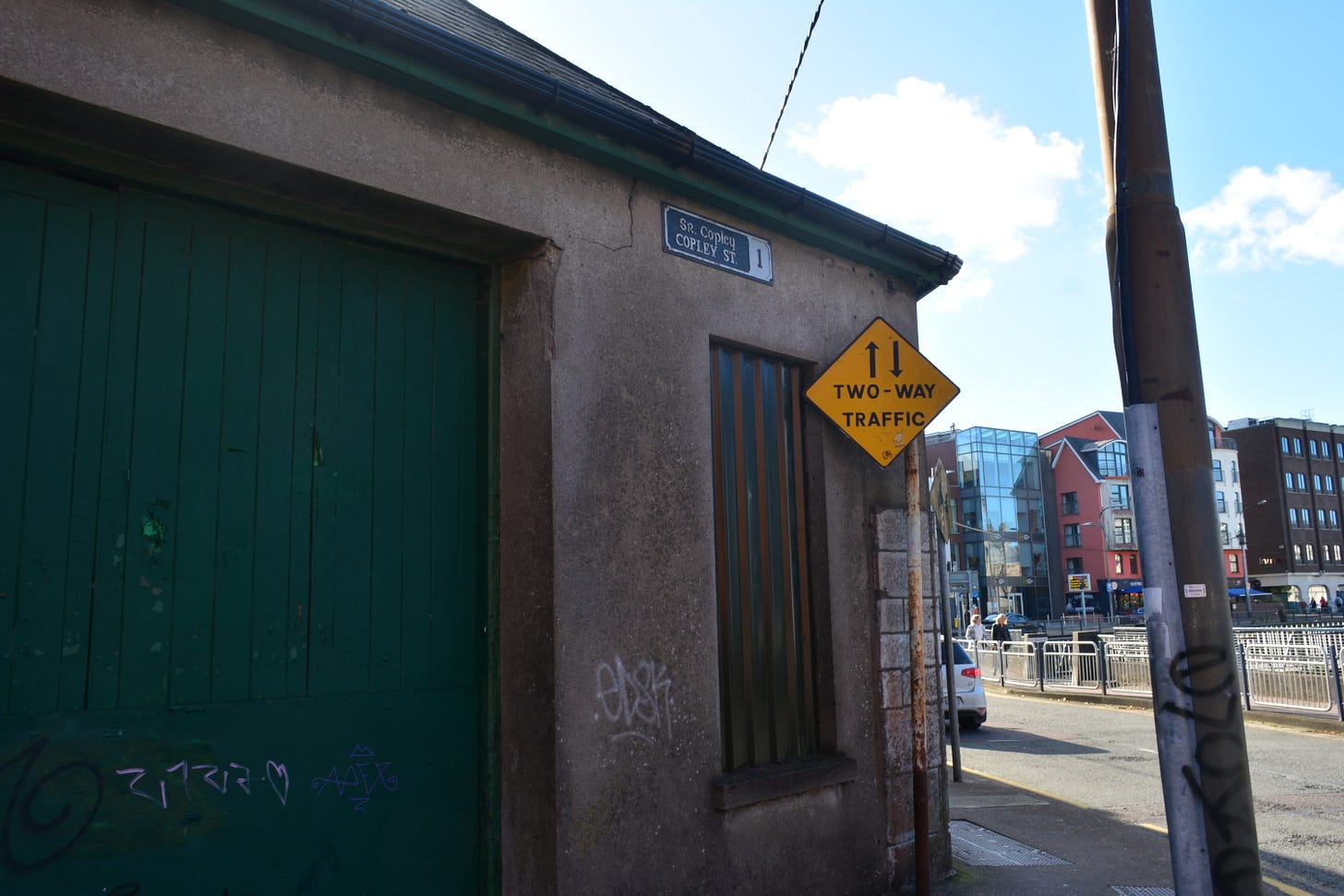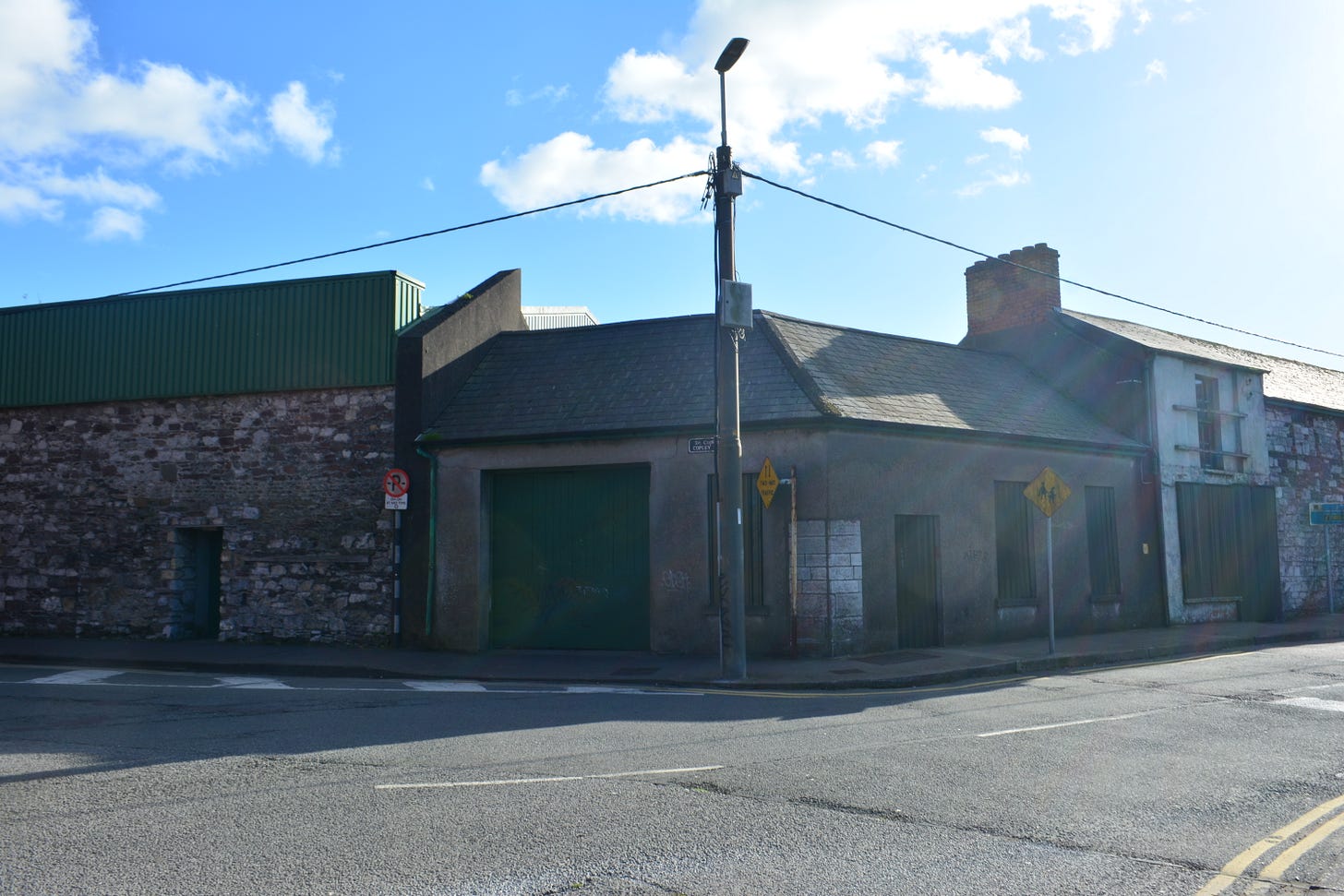Anatomy of a derelict and vacant site
A city centre site lay vacant and derelict for more than a decade before being sold by Dairygold to UCC for €17.25m in 2019.
This article first appeared in the winter print edition of Tripe + Drisheen.

File no 0934049 in Cork City Council’s planning database had so much potential.
Running to hundreds of pages, file 0934049 contains the multitudes: maps from the 16th and 17th centuries, drawings, sketches, photos, surveys, historical titbits, details of planting beds and of course plans for a new building, all bound together and presented to City Hall on August 19, 2009 along with the €38,000 application fee.
File 0934049 was the dream Alchemy Properties had for their “Trinity Quarter,” an exciting new seven storey development on the site of Brooks Haughton on South Terrace just before the street runs into George’s Quay, where the south channel of the River Lee meanders past Union Quay.
Alchemy Properties was one arm of Reox Holdings, a food and property company which was spun out from Dairygold, the agrifood giant, in 2006. Besides Alchemy Properties, Reox Holdings also included Reox Enterprises, a food business based in Holland, Prime Meats, which was sold in 2010 and 4Home superstores, which ceased trading in 2009.
I have spent months reading file 0934049, a useless historical document in many ways, but also a puzzling document: why did this complex and expensive plan never come to fruition?
The planning application brought in planners, engineers, architects, conservationists, lawyers, accountants all beavering away on the clock to get the Alchemy project over the line. It was a vision for a new mixed-use development for the city, one that would complement its surroundings, add value, and extend the city’s core business zone beyond South Mall with a mix of retail and office space and a function room.
Alchemy’s plan also included 18 and 19 South Terrace, the two boarded up, red brick houses on the street, which were now under their ownership. The row of houses on the northern side of South Terrace is today bookended by the giant mural of the hurler painted by Dublin artist ACHES and the squat warehouse buildings that once housed Brooks Haughton. They offer a glimpse of what Georgian Cork looked like. Their aesthetic heritage would ostensibly be safeguarded by Alchemy’s plan to turn them into offices.
19 South Terrace, one of the two boarded up houses on South Terrace, has been on Cork City Council’s Derelict Sites Register since 2001, which means the council is entitled to collect an annual levy based on the market value of the property. Levies were increased from 3% to 7% in 2020 in a bid to clamp down on the city’s dereliction problem.
While its neighbour, 18 South Terrace, is presently boarded up, it’s not listed on the Derelict Sites Register.
Exploit
In its planning application, Alchemy threw some shade at Brooks Haughton and its decidedly blue-collar use of the site.
“The area at present is a busy pedestrian area in close proximity to the School of Architecture, the School of Commerce and St. John’s College (sic) however the site was in use as a timber merchants and the opportunity to exploit the central location has been missed thus far,” the Alchemy application reads.
Nothing ever happened with that city centre site under Alchemy Properties’ stewardship. It’s as full of potential or as useless - depending on your viewpoint - as it was when the workers at Brooks moved out in August 2008 and Reox Holdings bought it from Wolseley, the UK-based plumbing and building supplies group.
Media reports put the 2008 selling price at €15 million. I tried to verify this with Dairygold, but never got an answer. What we do know is that when Dairygold sold it to UCC in 2019, the selling price was €17.25 million, according to UCC’s press release at the time.
Perhaps we’re fortunate that Alchemy Properties’ Trinity Quarter never materialised, because Alchemy wanted to demolish most of the existing site and stick up what looks, from the plans, like glass-fronted seven storey margarine boxes.
They were however able to turn a profit of at least €2.25 million on their investment.
Just as Alchemy had big plans for the site, so too do UCC; they want to move their entire Business School, upwards of 4,000 staff and students, into a city centre campus on the 1.4 acre site. When they bought the site from Dairygold, press reports spoke of 2022 as a possible moving-in date for the new city campus.
The purchase of the site by UCC is part of what the university characterises as a “long and successful relationship,” as UCC’s press officer wrote to me in an email. In the same year as the sale, a new Dairygold student bursary at UCC was announced.
The Dairygold Co-operative Society UCC Bachelor in Agricultural Science (BAgrSc) Bursary is annually “awarded to two Agricultural Science students for the duration of their undergraduate studies at UCC,” the press officer told me. “In addition, they are offered the opportunity to avail of work placements with Dairygold.”
The university has yet to submit a planning application for their business school; Covid-19 had set the project back according to the university’s press officer. A planning application will be lodged at some stage in 2022 and “construction will proceed once the planning process is completed and construction tenders are received.”
Safe to say any pigeons and rodents who have made their home in the South Terrace site won’t be evicted for a while yet.
Bear with us
In his letter to shareholders in early 2009, Flor Riordan, chairman of Reox Holdings, explained that he was conscious how bad the economic outlook was, coming off the back of the Celtic Tiger.
Profits were way down at Reox, which also owned the 4Home DIY stores. To that end, Alchemy Properties was downsizing, Mr Riordan wrote. And, as he said, it was a good thing Alchemy was “fortunate not to be committed to any construction projects inappropriate to the current economic climate.”
That note was dated 14 January, 2009.
Perhaps Alchemy were betting on better times ahead, because barely six months after Mr Riordan’s sober assessment of the construction climate, Alchemy had their Trinity Quarter planning application complete and submitted.
But it wasn’t all bad news for Alchemy. Jerry Henchy, the then Dairygold Chief Executive who was also a director at Reox Holdings, peppered his note in the same financial report with positives from a difficult year, tempered with warnings.
As well as the “prime commercial site” they had acquired on South Terrace, Alchemy had a 20 acre site in Mallow town for which permission had been granted for a mixed-use development. There were also permissions granted for housing developments in Cork and Limerick.
Mr Henchy wrote that “given the current market background outlook for the immediate future, Alchemy will carefully review all options in an effort to de-risk possible developments, but it is acknowledged that development projects have become difficult for the foreseeable future.”
“Alchemy is now focused on ensuring that it makes the most of its assets already owned and on monitoring the market to gauge the optimum time to further trade its assets. Disposals will only be contemplated where they are likely to secure significant value for shareholders.”
For this piece I talked to a lot of people, including developers, auctioneers and financial controllers. Cork is a small town, and yet no one seemed to know much or anything about Alchemy. They have, or had, an address at Cork Airport Business Park. I tried to track down one of the two signatories on the Alchemy Properties planning application for the South Terrace site. I found one whom I thought might be a possible match, called him up, and he told me he had no idea what I was talking about.
Essentially, what I wanted to know is what happened to the grand plans Alchemy Properties had for the Trinity Quarter, and indeed the 20 acre site in Mallow which had been granted planning permission. What was holding back Alchemy from exploiting the South Terrace site?
I asked Dairygold repeatedly but they never replied.
Hold and dispose
Dairygold finally decided to dispose of the Trinity Quarter site in 2019, and with it went the grand plan which had been gathering dust for nearly 10 years in City Hall.
Towards the end of 2014, Watfore Ltd. with an address at Clonmel Road, Mitchelstown, Co. Cork, where Dairygold has its headquarters, applied for a planning extension at the South Terrace site. Watfore’s primary business includes management of real estate.
In 2014, Dairygold executed a debt-for-asset swap with Reox Holdings acquiring 18 properties including the South Terrace site. The following year, 2015, Reox Holdings went into liquidation, with shareholders losing close to €250m, according to The Irish Independent.
The original expiry date for the South Terrace site was March 10, 2015, but Watfore was successful in getting an extension on the application. In granting the extension, Cork City Council’s senior planner wrote that “the applicant has stated that the projected commencement date is January 2017 and the expected completion date is January 2019. It is considered an extension of 5 years is reasonable.”
Dairygold are in the profit maximising business, and they are ultimately answerable to their shareholders. Each of the sites it acquired is, in hard terms, an asset, and like all assets they can increase or decrease in value.
While we don’t know why Alchemy and subsequently Dairygold never went ahead with the plans to develop the prime city centre site, the site was largely vacant and it was also home to 19 South Terrace, a property that’s one of the longest standing on the city’s Derelict Sites Register.
Cork, like every Irish city and town, is blighted by dereliction. In the Irish context it seems intractable and unsolvable. By one estimation from British financial website money.co.uk, Ireland has the tenth highest rate of vacant houses in the world.
When Tripe + Drisheen launched earlier this year, we did so with a series on dereliction and vacancy in Cork City. For that piece, I talked to Jude Sherry and Frank O’Connor, two of the most prominent campaigners in the country who have successfully shined a light on dereliction in Cork and across Ireland ever since.
The pair have also featured the Trinity Quarter site in a case study of dereliction and vacancy. It’s their contention that if Cork City Council had classified the entire site as vacant and applied levies, it would have netted the council €2.99 million in the past five years.
Before the site was eventually sold to UCC, it was also put on the rental market. In 2012, Savills, the estate agents, listed it with a guide price of €75,000 per year.
“The old Brooks Haughton’s yard is a great example of the lack of enforcement due to an inconsistent and unstructured process in applying the Derelict Sites Act 1990,” Jude Sherry told me. As she pointed out, a derelict property does not have to be empty, vacant or unused for it to be placed on the Derelict Sites Registry.
Beyond Alchemy’s board you wonder how many shareholders of Reox and Dairygold actually even knew that their money was invested in a derelict site. On paper it was a prime asset.
At one stage I came close, closer than I’d been at any stage, to finding out more about why Alchemy Properties grand designs for Trinity Quarter never came to fruition. A former executive had provisionally agreed to talk with me, provided that person was cleared to do so by Dairygold first, as they had signed non-disclosure agreements with Dairygold.
And so I contacted Dairygold. Again. And again. But got nothing. Should Dairygold reply we will update this story on Tripe + Drisheen to include their side of the story.
Jim Woulfe, Dairygold’s chief executive, in his statement to the media when the dairy company finally offloaded Trinity Quarter in 2019, said that “Dairygold is pleased to be in a position to facilitate UCC’s establishment of a world-class business school in Cork City.
“This agreement is in line with our strategy of maximising the value of our non-core property assets and divesting of them to facilitate investment in higher margin dairy business initiatives. We wish UCC every success with its new business school.”







Very good article. Suggestion for next investigation is what is going on with Port of Cork/ Custom Bonded warehouses development
I think you, JJ, should invest some time into studying the methods of countersurveillance. I did some research and, in your home, you should "look for oddly placed mirrors or decorations and also check stuffed animals and clocks" because that's where they like to hide bugging devices. Also get a GPS tracking detector, in case information on your movements is being finagled by devious means.
This murky Alchemy Properties surely have eyes on you after this article.